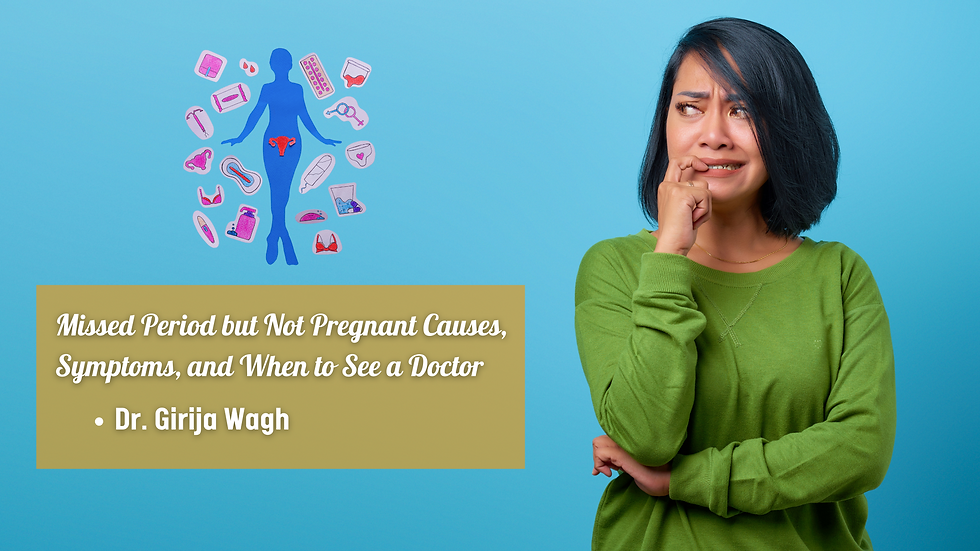Missed Period but Not Pregnant Causes, Symptoms, and When to See a Doctor
- Dr. Girija Wagh

- Aug 14, 2025
- 2 min read

Missed Periods? Here’s Why It Doesn’t Always Mean You’re Pregnant
A missed period can cause concern, curiosity, or even excitement, depending on your situation. While pregnancy is one of the most common reasons for a missed period, it is far from the only cause. In fact, many women experience delayed or absent periods due to reasons unrelated to pregnancy. Understanding these causes and seeking timely medical advice is crucial for your health and peace of mind.
Why Missed Periods Happen Without Pregnancy
Lack of Ovulation (Anovulation)
Your menstrual cycle depends on ovulation — the release of an egg from your ovary. If ovulation does not occur in a cycle, your body may not produce the hormones needed for a regular period.
Causes of anovulation include hormonal imbalances, stress, polycystic ovary syndrome (PCOS), and significant weight changes.
Weight Changes
Increased Body Weight: Excess body fat can lead to higher estrogen levels, which can interfere with the normal hormonal rhythm of your menstrual cycle.
Sudden Weight Loss: Rapid or extreme weight loss can also disrupt hormone production and cause your periods to stop temporarily.
Hormonal Medications
If you have recently started, stopped, or changed hormonal contraceptives (such as birth control pills, injections, or hormonal IUDs), your body may take time to adjust. This can cause skipped periods or irregular cycles for a few months.
Thyroid Disorders
Both hypothyroidism (underactive thyroid) and hyperthyroidism (overactive thyroid) can disrupt menstrual cycles. The thyroid gland regulates metabolism and influences many body functions, including reproductive hormones.
Stress and Lifestyle Factors
Emotional stress, excessive exercise, and disturbed sleep patterns can all affect your menstrual cycle. The brain and reproductive system are closely connected — when your brain perceives high stress, it may delay or stop ovulation as a protective mechanism.
Other Medical Conditions
Conditions like PCOS, pituitary gland disorders, or premature ovarian insufficiency can also lead to missed periods.
Why You Shouldn’t Ignore a Missed Period
A single missed period may not be a cause for alarm, but if it happens repeatedly, it could be a sign of an underlying health condition. The sooner you identify the cause, the sooner you can begin treatment — and in many cases, prevent further complications.
What To Do If You Miss Your Period
Take a Pregnancy Test
If you’re sexually active, rule out pregnancy first. Home pregnancy tests are widely available and easy to use.
Consult Your Doctor
If your test is negative and your period still doesn’t arrive, book an appointment with your gynecologist. They may recommend:
Hormone level tests
Thyroid function tests
Pelvic ultrasound
Lifestyle and nutrition evaluation
Follow the Recommended Treatment
The treatment will depend on the cause. This might include:
Weight management
Hormonal therapy
Thyroid medication
Stress management techniques
Treating underlying medical conditions like PCOS
Key Takeaway
Missing your period does not always mean you are pregnant — it can happen for various reasons, including hormonal imbalances, lifestyle changes, or medical conditions. Timely diagnosis by a qualified doctor is essential for identifying the cause, starting the right treatment, and restoring your menstrual health.







Comments